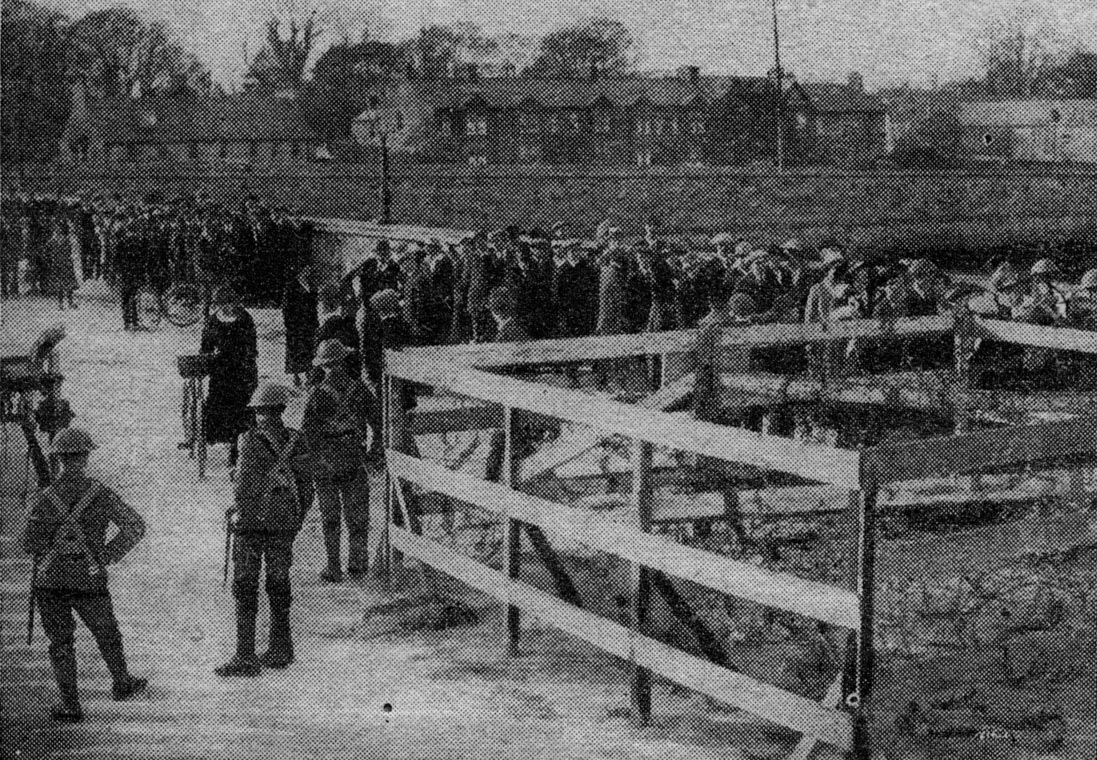Limerick people locked out of city after attending hurling match
Limerick, 22 April 1919 - About 1,000 people were ‘locked out’ of Limerick city by military force yesterday after leaving to attend a hurling match in Caherdavin.
The city was proclaimed a special military area last week due to an ongoing strike, and authorities stated that no one would be allowed enter the city without a permit. The supporters, not having permits, were refused entry as they aproached Sarsfield Bridge and this led to a standoff with police on the outskirts of the city and, as a protest, they refused to request permits. They sang songs in Irish and were addressed by Thomas Johnston, the Labour Party leader.
Shortly before midnight some of the crowd crossed the Shannon in boats, but the majority of them were accommodated in private houses in Thomond Gate, which is located outside the military area.
The demonstrators were greeted with shouts of support from houses along the river on the city side.

Left: One of the notes issued by Strikers' Committee as a protest against Limerick being placed under martial law. Right: Armoured car with Policeman seated at the back and a group of police on pavement at the funeral of Bobby Byrne. (Images: Daily Sketch, 24 April 1919 and Sunday Pictorial, 13 April 1919)
Ongoing strike
A strike proclamation was issued on 14 April in protest against
the military presence in the city. Yesterday this was extended to a general strike; the
workers of Limerick declared that ‘no work whatever’
would be carried out. Shops, factories and warehouses are now
closed with over 14,000 workers now idle. There are limited
exceptions made for the distribution of milk and the supplying of
bread from bakeries. Chemists’ shops are allowed to operate
on Sunday hours.
Funeral of Bobby Byrne
The tensions in Limerick arose from the proclamation of the city
as a special military area in advance of the funeral of the late
Robert (Bobby) Byrne, a Sinn Féiner and trade union
activist. Mr Byrne, was killed by a bullet wound sustained in an
affray in Limerick Workhouse Hospital where he was being held
under a police guard. Mr Byrne was killed in the course of an
attempt to rescue him from the workhouse. Two policemen were also
shot during the incident; Constable O’Brien was killed and
Constable Spillane was badly wounded.
The jury at the inquest into the death of Mr Byrne adjudged his shooting to have been a ‘deliberate’ act. Their verdict declared that ‘Robert J. Byrne met his death by a revolver bullet discharged by either Constable O’Brien or Constable Spillane’.
The government proclamation stressed that they did not wish to interfere with the ‘solemnity and dignity of any funeral ceremony’, but equally stressed that they couldn’t countenance any defiance of the law and that anything in the shape of a ‘military parade or assembly in military formation will at once be stopped’.
The warning did not prevent thousands from turning out to attend the deceased man’s funeral.

Scenes from the Limerick strike: (Left to right) Soldiers placing bar barbed wire on a bridge to prevent it being rushed, a clerical critic of one of the barbed-wire entanglements and Irish dancing at the Cahirdavin gathering, the object of which was to protest against the necessity of permits to enter the city. (Images: Daily Mail, 19 April 1919 and Daily Sketch, 24 April 1919 via Bureau of Military History)
Support for the strike
The subsequent strike has drawn support from labour organisations,
not only in Ireland but across the Irish sea as well.
Cathal O’Shannon, Irish labour activist, addressed the British Socialist Conference in Sheffield about the Limerick situation. Mr O’Shannon told delegates that the strike would continue until the military climbed down. No permits, he said, would be accepted. To laughter, he added that it was bad enough to work, without having to get a permit.
Dr Brian Hanley explains that the language of the Russian revolution was adopted by different republican and labour groups in Ireland. One example of this was the Limerick Soviet, which was declared during the strike in April 1919
[Editor's note: This is an article from Century Ireland, a fortnightly online newspaper, written from the perspective of a journalist 100 years ago, based on news reports of the time.]





















